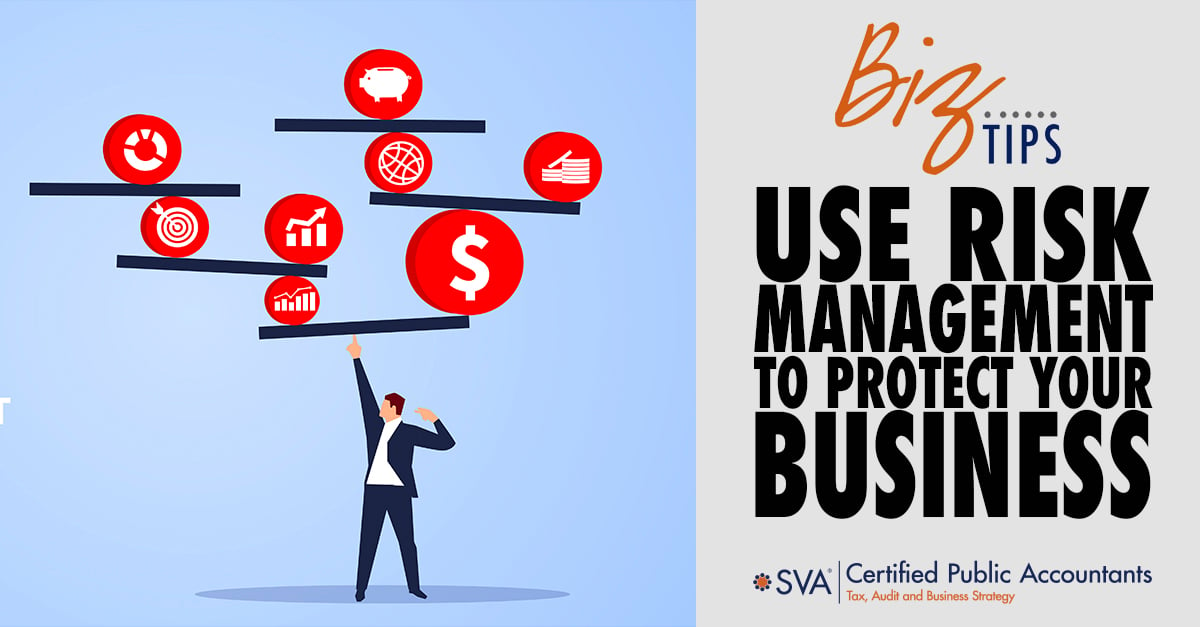Taking risks is a part of running a business.
Do you buy an expensive piece of equipment to make a new product? There is a risk that the new product doesn’t sell and you are stuck paying for equipment that doesn’t make the company money.
Other kinds of risks happen based on how well your company is prepared. The result of a risk isn’t always about what you gain by taking it, but also how much you can lose by not preparing for it.
Below we will briefly discuss seven different types of risk businesses are subject to daily and ways to prepare your company for each:
-2.jpg?width=700&name=Risk%20(1)-2.jpg)
1. Operational Risk
What is operational risk?
Operational risks are events that can impact a company in different ways such as natural disasters, power outages, or procedural and personnel failures.
Natural disasters are a stand-alone risk. No one can control extreme weather events. For these situations, make sure you have proper safety measures in place such as designated safe areas for employees to go to during severe weather. Also, make sure you have all critical electronic data backed up at an offsite location. This is especially true for power outages/surges as these events can have devastating effects on electronic equipment.
Failed processes and human error are also risks to companies.
- What happens when a vital piece of equipment goes offline for a while?
- Do you stay up at night thinking about what you would do if a certain indispensable employee quit their job or was out for medical reasons? Are there others who can fill their shoes?
Play some of these scenarios out and work on creating a Business Continuity Plan that will be your reference when events happen that impact your company. Make sure you have trained employees in different areas of the business so that if an employee leaves, there are people who can fill in to carry out their duties.
2. Financial Risk
There are always risks when talking about cash, credit, and business debts. Here are a few examples and what you can do to minimize those risks:
- If you extend credit to customers, be sure to keep an eye on how much credit you are offering. If too much credit is given or you are having trouble collecting from customers, it will cause cash flow problems.
- Carrying too much debt can impact your financial situation as well. Interest rates are constantly fluctuating, therefore adjust your business plan so you can start paying down your debt as quickly as possible.
- Does a majority of your income rely on a small handful of customers? What if you lose one or more of these customers? Make an effort to expand your marketing efforts to add new clients so you are not relying on a few to keep your business afloat.
Keep a vigilant eye on your financial situation and take advantage of situations where your cash flow is good to pay down debt and increase your customer base to provide additional revenue streams.
3. Economic Risk
The economy is like the ocean. Sometimes it has gentle ups and downs. Other times it can have significant high waves and low troughs. Take the necessary steps to make your company “seaworthy” against economic storms.
Keep up to date on the news in your industry to help you identify trends that will be impacted by the economy. Ask yourself the following questions:
- If there is a decrease in the economy, what steps would I need to take for the company to survive?
- How does the company’s cash flow situation look?
- Are there ways to trim the budget and overhead now to be ready for downturns in the economy?
Don’t wait until the storm hits to start preparing. Run your company efficiently no matter how the economy fairs.
4. Compliance Risk
Compliance is very important in business. There are federal and state compliances regarding protecting data and customer payment processing. Are you keeping your customers’ personal information safe? Do you have steps in place to keep their payment information from becoming public knowledge? Non-compliance can result in fines, loss of revenue, and loss of reputation, all of which will hurt your cash flow and bottom line.
Review your current processes and take the time to ensure your company is following all laws and regulations. If you are unsure of your compliance status, it would be well worth it to hire an outside consultant to help you with compliance issues.
5. Reputational Risk
As the old saying goes, “You can’t make everyone happy all the time.” While this is very true, your goal as a business owner should be to make every customer happy every time.
In the past, word of mouth was the method used to tell people about your experience with a company or their products or services. It would take time for the word to spread, for both positive and negative experiences.
In this digital age, an unsatisfied customer can post a review not only to your website but also to social media, reaching a larger audience with the click of a button. More and more consumers use reviews in their decision-making process when purchasing products or services.
It’s crucial to monitor your reviews and respond to them promptly. If the review is good, thank them. If the review is negative, use their feedback to see if there is an unknown issue with one of your company’s processes or a certain employee. Make sure to thank them, address their complaints directly, and take the steps necessary to correct the situation. In some cases, customers will change their reviews if their problem is handled properly.
Negative customer reviews are a great source of information and can sometimes identify problems you weren’t aware of. Respond promptly and courteously, and they can be a useful tool to help your company succeed.
6. Security/Fraud Risk
Scroll through the daily headlines of your favorite news website and the odds are good you will come across a story involving a company that had a data breach.
Most companies don’t want to budget money for IT security, thinking it won’t happen to them. If you don’t want to hire a person or staff to monitor your systems, look to outsource your IT security needs.
A simple click on a link in a phishing email can cause all sorts of problems. Educate your employees on what phishing emails look like so they know not to click links. Implement processes where they can report any suspicious emails to your IT department so that filters can be put in place to help block future fraudulent emails.
Yes, it does cost money to put processes in place to keep hackers from infiltrating your company’s files, but imagine the cost if your company’s data was breached and all your customer’s personal information was compromised. It’s a good bet the amount of business you will lose, plus the legal and settlement fees would far outweigh the cost of strengthening your IT security. This is definitely not a risk worth taking.
7. Competition Risk
Competition risk, also called comfort risk, can happen when a company becomes complacent or comfortable with how it is conducting business. The trouble is that your competitors are working hard and developing products or services that could possibly cause your customers to leave you. They may also be looking at ways to transform the industry and following trends while your company sits and offers the same services and products it has for years.
To mitigate this risk, always look for ways to improve your products and services as well as your internal processes. Watch your competitors and see what they are offering and how they are presenting this to potential customers. Be prepared to pivot quickly to adapt to new trends and customer needs.
Too often business owners tell themselves “that won’t happen to my company,” and they don’t take the necessary steps to prepare for risks. That in itself is a considerable risk. Don’t be reactive and wait to see if something happens.
Go on the offensive and review your company from top to bottom and take the necessary steps to lessen the effects of these risks when they happen because, at some point, they will.

© 2021 SVA Certified Public Accountants

